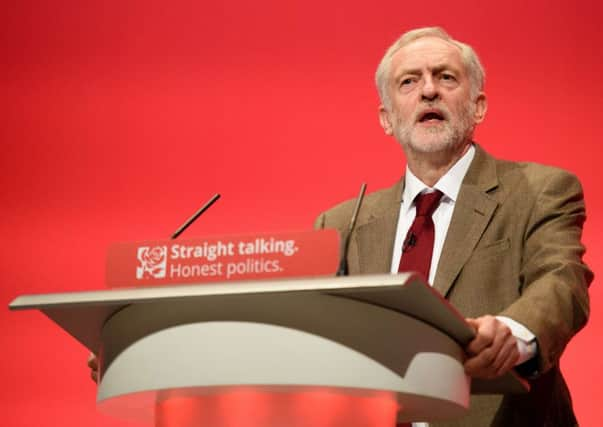Leaders: Corbyn supporters and Tories will be happy


Those in Brighton for the big occasion spoke of the tension building as conference waited for the man, who, depending on your point of view, is destined to be Labour’s saviour or its annihilator.
Perhaps unsurprisingly, the reviews were mixed after Corbyn left the podium.
Advertisement
Hide AdAdvertisement
Hide AdTo the left-wingers who have flocked to Labour in the hope of a new political dawn, he was brilliant.
The fraction of these new supporters who made the trip to Brighton reacted noisily and enthusiastically.
To the doughty veterans of Labour Conferences past, he was certainly different.
The careful choreography of previous events was conspicuous by its absence. Also absent was the slick charisma and artful presentation of Tony Blair or the pulpit thumping certainty of Gordon Brown.
Wearing a brown suit (and a tie), he cut an unprepossessing figure. At times it was difficult to imagine this bearded chap with a meandering delivery leading the Labour Party to the promised land.
But it is the fact that he represents a departure from Brown and Blair that is the key to his success.
In the four-way leadership contest over the summer, an energised Labour Party comprehensively rejected the New Labour text-book. They voted for something different and got it.
After winning 59 per cent of the vote, Corbyn’s mandate to lead Labour is indisputable.
Advertisement
Hide AdAdvertisement
Hide AdBut when one digs deeper than the rambling jokes made at the expense of the media and his plea for a more caring and “kinder” society, some of the considerable difficulties he faces become apparent.
For example, Corbyn restated his opposition to renewing the Trident nuclear weapons system – a stance not shared by his shadow defence secretary Maria Eagle, who he has asked to lead a review on the issue.
Yesterday’s debate on Trident may have been pulled from the conference agenda, but it will come back to expose the deep divisions within the party.
Corbyn’s rise to the leadership may have been unstoppable, but he has still much to do to convince Labour’s parliamentarians – very few of whom actually supported him in the election contest.
And it is on the nitty-gritty of policy where he faces a stiff challenge to win the MPs, MSPs and Assembly members over.
At some point in the near future the difficult policy decisions are going to have to be made.
His most important challenge, however, is convincing the wider British public that he can win a general election. There was a sense that his message – while popular with his supporters – did not resonate with the electorate at large.
The Corbynites may have left the conference hall in a buoyant mood, but their joy will be shared by the Tories.
Search may have found an answer
Advertisement
Hide AdAdvertisement
Hide AdPolice Scotland’s enthusiasm for “stop and search” has been an emotive and controversial.
Claims that children under the age of 12 were being searched and the sheer number of individuals being indiscriminately stopped by officers meant civil liberty campaigners were justifiably concerned about the practice.
Accordingly, justice secretary Michael Matheson’s long-awaited decision to outlaw non-statutory stop and search is to be welcomed. There is, however, still the need for the police to have appropriate powers to deal with the problems that blight Scottish society.
Yesterday MSPs passed an amendment which could lead to new laws to allow police to stop and search under 18s when they have a “reasonable suspicion” they are carrying alcohol.
At first glance, this would appear to be a commensurate step given Scotland’s long-standing problems with under-age drinking. But what is clear from past experience is that these new powers would have to be managed appropriately.
Police Scotland would have to take the utmost care not to return to the bad old days of the recent past when non-statutory stop and search was pursued with too much alacrity and well-founded concerns were regularly raised at Holyrood and elsewhere.
Alcohol abuse, however, is such a searing driver of anti-social behaviour and the cause of so much misery that police must have the ability to act.
On balance, the proposed measure would appear to be a suitable step in the right direction, with the important rider that it is used responsibly. Achieving that balance will prove challenging. But if that challenge is met, the new proposals should work.